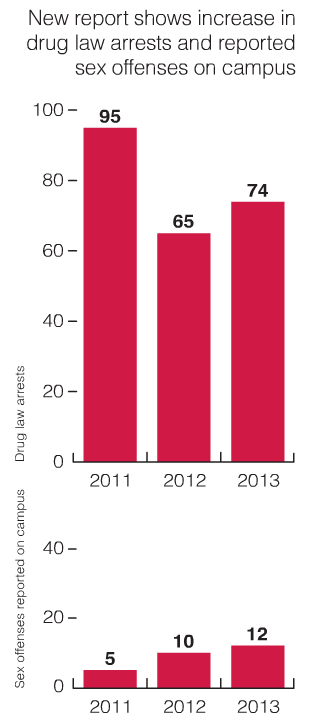University Police releases 2013 campus crime statistics
October 1, 2014
The Annual Security Report for 2013 was released on Saturday, outlining crime statistics on campus. Skip Frost, deputy chief of the University Police Department, outlined what the numbers entail.
Robberies
In 2013, 10 robberies were reported on campus, an increase from four robberies reported in both 2012 and 2011. Robbery is defined as theft through force, whether it is with a weapon or by physical force. However, the number can be misleading due to individual cases, Frost said.
If a large number of robberies is reported, the increase could have been the same individual in each situation. Once this individual is arrested, the police notice an immediate decrease in robbery.
Burglary
Get The Daily Illini in your inbox!
Burglary has decreased, as eight offenses were reported in 2013, but 15 were reported in 2012 and 30 in 2011. Burglary on campus is defined as the intention of theft by entering illegally without a physical interaction.
“There are crimes of opportunity. Remove the opportunity to remove the crime,” Frost said. He added that there is a need to make students on campus aware of the importance of locking doors even if all floor members appear trusting.
Drug law arrests
The two most prevalent drugs on campus are alcohol and cannabis, Frost said. He added that even with a prescription, cannabis is not legal on campus, although more students have been trying to claim they have prescriptions for cannabis from states where the drug is legal. However, the legality does not carry over into Illinois.
Recently, there has also been an increase in the drug MDMA, also known as Molly.
“Those cases (of ecstasy/Molly) are extremely troublesome to us because a lot of times it’s not just the drugs themselves, it’s the behavior and the activity that occurs afterwards, (such as) someone who has a bad experience with a drug that can’t successfully deal with it, such as excited delirium … If we don’t get them medical treatment very quickly they can expire and die from that.”
Additionally, there has been an increase in the possession and selling of prescriptions drugs, such as Adderall, which can be equally as harmful if not taken properly.
{{tncms-asset app=”editorial” id=”05cf7822-493e-11e4-9ed0-001a4bcf6878″}}
Sexual assaults
Sexual assault is the most underreported crime on campus, Frost said. While the offenses have increased, the numbers can be misleading because the increase only includes reported offenses.
“We believe that our efforts by education through the RAD, or Rape Aggression Defense, program and other outreach programs have convinced people that they need to come forward and report these incidents,” Frost said.
Programs similar to RAD and those offered at the Women’s Resource Center educate students on what valid consent means.
“It is important that we have this ongoing meaningful conversation and dialogue with our students about the meaning of sexual assaults,” Frost said.
The University Police Department takes sexual assault very seriously and follows cases with vigorous investigation and procession, he added.
Liquor law arrests
The department issues fewer than 150 underage citations a year, Frost said, equivalent to three citations per week.
“While drinking may not be our number one focus, it’s something we focus on because we know there is a very strong correlation between alcohol use and abuse; and sexual assaults, batteries, drug offenses,” Frost said.
The decrease in liquor law arrests is dependent on the year, and many factors play into the amount of arrests that occur, Frost said.
“These are liquor law violations. These are not actually citations and arrests made. When we find someone who’s highly intoxicated, we might not cite them in any way, shape or form, but we issue them an alcohol incapacitation form, which goes to the Alcohol or Other Drug Office,” Frost said.
Elyssa can be reached at [email protected].







